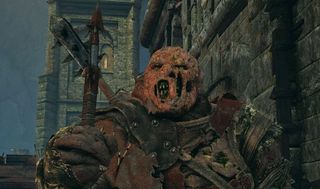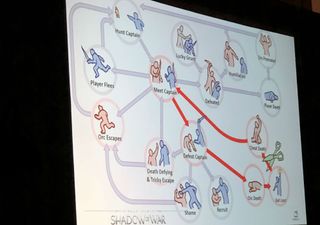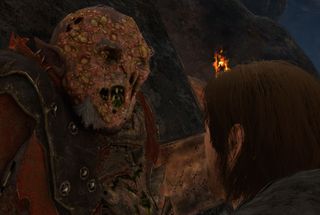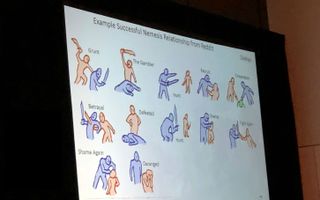
Harassment and toxicity are once again hot topics at this year's Game Developers Conference, but I didn't expect to come face to face with my own cyber bully. During a talk entitled "Helping Players Hate (or Love) Their Nemesis", Chris Hoge pulled up a slide with a screenshot of my 'F*** This One Particular Orc' article. And there he was in all his rancid glory: Mozû the Blight. My green whale. The ultimate nemesis. "I actually wrote that," I spluttered, to a light ripple of applause because they knew my pain. Hoge just laughed at me.
Hoge, who previously worked on the software for F-16 fighter planes, is now lead systems designer at Monolith Productions, and therefore supremely placed to explain what's going on under the hoods of Shadow of War's green-skinned antagonists. He explained that the best player relationships with orcs are like rollercoasters with lots of ups and downs. "We want the ride to be really long, because it gets better," says Hoge. From it's work on the first game, the Monolith team discovered that the more stress and frustration an orc induced, the more satisfaction and jubilation resulted when the player finally got the upper hand.
The key to a good nemesis, as I know only too well, is therefore finding yourself caught in something Hoge calls the "Revenge Loop". This is the process whereby you keep struggling and failing to kill an orc, during which time its abilities improve and your unhealthy codependency deepens. For the player, the fun part comes from working out how to break the loop, which usually means by taking advantage of one of the orc's weaknesses—whether that be to stealth, beasts, or in Mozû's case the poison that had left him looking like a two-week old pizza left in the Kalahari sun.

In order to ensure no orc became truly unconquerable, Hoge explained that one of their weakness is secretly baked in, meaning that it won't be removed no matter how much the orc levels up. If you've played the game you'll know that even the lowliest orc can potentially become a captain if it lands a killing blow on the player, for which it's rewarded with a promotion. Aside from a few hand-crafted storylines involving orcs like Bruz, which orcs go on to become your nemeses is handled entirely systemically.
Brilliantly, one of the main determining factors is an index called PIS, which stands for player interaction score. This measures your relationship with every orc in the game. If you have a high PIS rating with a particular orc, it's more likely that it will be able to 'cheat death'. "We need cheating death to be an exception," explained Hoge. "It can’t happen to every orc, it has to be an amazing thing." Orcs with good PIS also have their chance to be on the receiving end of a random decapitation removed, which otherwise would guarantee a true death. They're only safe a few times, though. Eventually the immunity is removed behind the scenes, and Talion can add that noggin to his sizeable collection.
Boiling your PIS
There's more to making a memorable nemesis than a PIS score though. Appearance is key, and though the orcs are generated procedurally, those systems are designed to ensure they have the most chance to grab the player's attention. So for instance if an orc gets given the name Blarg Fireguzzler, there's a good chance he'll get a flaming sword, or wear a burning brazier for a helmet. Hoge noted that what really mattered was how the orc looked from the head and shoulders up. Players wouldn't even notice sweet design lower down, like jars of eyeballs hanging from a belt.
Orcs are also taught to remember their individual history, even if the player doesn't. For example, it might say: "You ran away last time, manthing!" Again, having certain rare traits helps to make individual orcs stick in the memory. Only around 6% of orcs will get the 'Humiliator' perk, which they use to shame Talion after each victory. When it first happens you're both amazed and immediately enraged. There are also a handful of unique orc archetypes, each of which can appear just once per playthrough. An orc with "the Claw" title will be one whose arm you hacked off and has come back with a metal replacement, while "the Uncatchable" is an Orc that escaped your blade three times.
The biggest gaming news, reviews and hardware deals
Keep up to date with the most important stories and the best deals, as picked by the PC Gamer team.

Unsurprisingly, Mozû was one of these orcs. His "the Blight" title meant he'd been transformed by poison, which in a delicious piece of irony also proved his eventual undoing. In a Q&A session after the talk I asked Hoge if Monolith keeps data on the most amount of times a player has been killed by the same orc. He told me they do, but that it's hard to parse what's genuine because some players allow themselves to be killed by one orc 100s of times to level it up, and then painstakingly use the 'shame' mechanic to reduce that orc back to a gibbering level 1 dolt. I deeply hope the identity of these players is being passed to the authorities. Or at the very least PETA.
These rare encounters are key to making a system-driven game feel fresh. It's important that the player isn't able to see how things are being manipulated under the surface, because that would rob Shadow of War of its mystery, and thus some of the drive to explore. Indeed, I agree with this idea that one of the main themes at this year's GDC has been how good narrative is increasingly being generated by systems rather than hand-crafted storylines. It was also prevalent in this Assassin's Creed: Origins session I attended. The blur between story created by systemic vs bespoke content is only likely to keep blurring further.

Tantalisingly, Hoge mentioned a couple of possible interactions that I didn't see at all in my full playthrough. He gave the example of an Olog-Hai titled "the Sword Breaker", who will snap your prized weapon if he wins in combat. Hoge said they were frightened some players would rage quit on the spot and never come back, so they added a feature that enabled players to get their weapon back by killing the orc that had broken it. The weapon would even be leveled up as a reward.
Another cool encounter which I didn't experience was a special sort of ambush in which the enemy orc turns up with one of your followers held hostage at knifepoint. At the start of the fight he slashes' your buddy's throat, and you have to juggle trying to heal him up and handling the bad guy's ministrations. But the ultimate peak on the rollercoaster, according to Hoge, is when one of your favorite orc followers turns heel.
Monolith began assessing features based on whether players would be likely to blog about them.
Hoge noted that players learn to love their best orcs in a way that Talion and Celebrimbor never do. We level up our favorites and give them their own fortresses, and in response sometimes they even turn up to give us gifts or even, very occasionally, save us from a killing blow by instakilling an enemy captain at the last second. Or they betray you, because hey they're orcs and that's what they do. Either way Hoge is happy, because it helps extend your personal story with that orc. "Now you've got another hill on the rollercoaster, and more emotions to express."
Hoge even says that Monolith wrote all the words in Shadow of War—both dialogue and in-game text—with a mind to making it as natural and shareable as possible, because they wanted players to tell their friends these incredible stories. They even began assessing features based on whether players would be likely to blog about them. Which I guess is exactly what I ended up doing. If only I could have recruited Mozû, we could have ruled Mordor together. Instead I had to gank him in a back alley with a bunch of poison-daggered orcs, one of whom was riding a warg. Which, in some ways, is how all great love stories should end.
With over two decades covering videogames, Tim has been there from the beginning. In his case, that meant playing Elite in 'co-op' on a BBC Micro (one player uses the movement keys, the other shoots) until his parents finally caved and bought an Amstrad CPC 6128. These days, when not steering the good ship PC Gamer, Tim spends his time complaining that all Priest mains in Hearthstone are degenerates and raiding in Destiny 2. He's almost certainly doing one of these right now.
Most Popular


